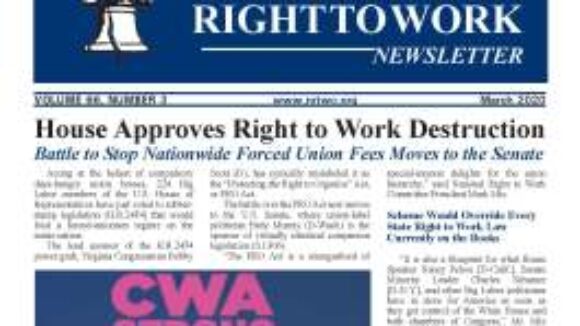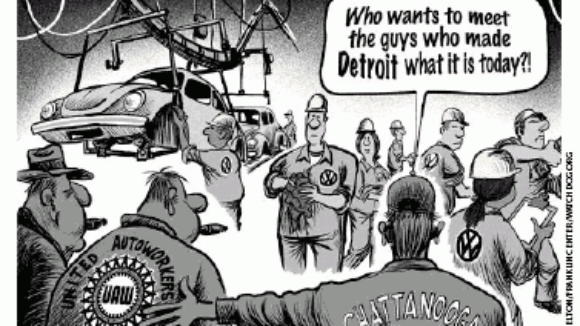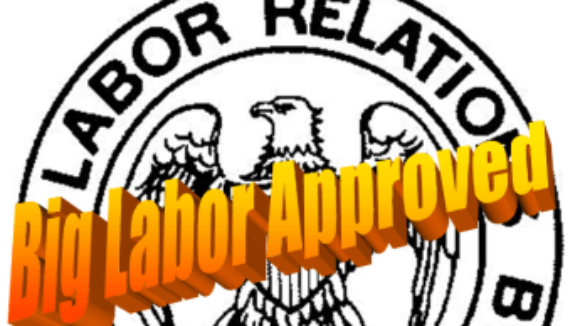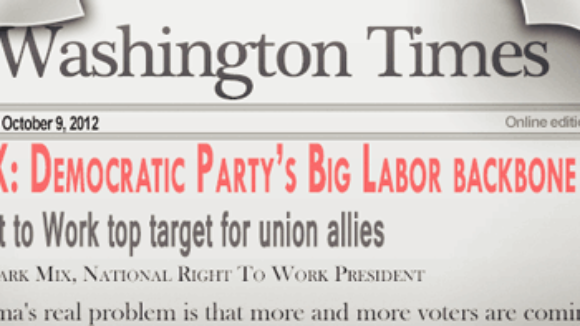Continue to Remember Your Work Rights Post-Labor Day
Today marks one week since Labor Day, and as we all head back to work after another weekend, let's not forget our rights as hard-working citizens.

Today marks one week since Labor Day, and as we all head back to work after another weekend, let's not forget our rights as hard-working citizens.

Here's where you can go to read the March 2020 National Right To Work Newsletter!

Union Kingpins Still Seek Monopoly Control Over Chattanooga Plant (From the August 2014 National Right to Work Committee Newsletter) Last fall, United Auto Workers (UAW, AFL-CIO) union bosses’ multi-year, lavishly funded…
The Washington Times agrees with us that collusion between management and Big Labor to force workers into…
The Washington Times examines how big labor destroyed the Hostess Bakery Company: The ding dongs at Big Labor who refused to make concessions when Hostess Brands, the makers of Twinkies, Drake’s Cakes and Wonder Bread, faced imminent…

The Washington Times takes the president and the NLRB to task for ignoring a recent appeals court decision invalidating the president's appointments to the board: When the Constitution puts a limitation on executive authority, the president can’t just ignore it for the sake of convenience. That message was delivered forcefully on Friday in a decision by the U.S. Court of Appeals for the District of Columbia Circuit. A unanimous three-judge panel declared unlawful President Obama’s installation of three appointees to the National Labor Relations Board while the Senate was in session. The president is compounding his disregard for the Constitution by thumbing his nose at this well-reasoned decision. The nation’s founding document grants the president authority to “fill up all Vacancies that may happen during the Recess of the Senate.” The appellate panel’s ruling points out the use of “the Recess” as opposed to “a recess” or “an adjournment” was not accidental. The term refers to the long break between congressional sessions in which it makes sense for the president to make an interim appointment because the Senate is not available to provide its advice and consent. In his ruling, Chief Judge David B. Sentelle refused to accept novel interpretations meant to expand the appointment authority, saying, “We will not do violence to the Constitution by ignoring the Framers’ choice of words.” Desperate to stack the National Labor Relations Board with Big Labor cronies, the White House refused to allow an old piece of parchment get in the way. On Jan. 4, 2012, Mr. Obama made the appointments even though the Senate was conducting “pro forma” business and the House of Representatives purposely chose to remain in session to thwart the potential recess appointments. Administration lawyers argued before the court that the president, not Congress, had the ultimate power to decide when the Congress was in session. Under this interpretation, Senate participation in the nomination process would be converted from a check and balance on the executive to an empty formality.

Right to Work top target for union allies From the Washington Times: As President Obama and Vice President Joseph R. Biden campaign for re-election, they feel compelled time and again to remind anyone who has gathered to hear them that America's economic troubles started well before they got to the White House. [media-credit name=" " align="alignright" width="480"][/media-credit]American voters surely know that. The Obama ticket's real problem is that more and more voters are coming to understand that the current administration has no clue about which policies would help the national economy, and workers in particular, get back on track. Emblematic of the president's befuddlement was his jibe against Right to Work laws at a Labor Day rally in Toledo, Ohio. Right to Work laws make it illegal to deny an applicant a job or to fire an employee simply for refusing to pay dues or fees to an unwanted union. Mr. Obama insisted without offering any evidence that individual freedom of choice over union affiliation is somehow bad for wages and salaries. At a campaign event in Detroit the same day, Mr. Biden repeated basically the same canard and vowed that the Obama administration would block national Right to Work legislation. What are the facts about Right to Work and employee compensation? Nationwide, inflation-adjusted U.S. Commerce Department data show that wage and salary disbursements to private-sector employees grew by just 1.8 percent from 2000 to 2010. That's the smallest gain for any decade since the Great Depression. But regional data show that employees and job seekers in the 22 states that had Right to Work laws on the books at the beginning of the millennium fared far better than average, with real private-sector wages and salaries increasing by 8.6 percent, or nearly five times the national average.

New rules promulgated by the Obama’s National Labor Relations Board (NLRB) eviscerate employee privacy and leave employees vulnerable to union intimidation tactics at home as well as in the workplace. A vote is scheduled today on…

Most employees working under a union contract have never voted to be organized by a union. Sen. Hatch and Rep. Scott want to fix that wit the Employee Rights Act. From the Washington Times: In an effort to loosen labor’s grip on workers, two GOP lawmakers want legislation that would require workers to re-affirm the existence of their unions with new votes every three years. Sen. Orrin G. Hatch of Utah and Rep. Tim Scott of South Carolina are pushing the Employee Rights Act that also would place limits on strikes, how fast a union can organize and how membership fees may be used to support political candidates. The bill has yet to receive a committee hearing in either chamber. Few workers - less than 10 percent of union members - vote to organize. Instead, most workers join an existing union as a condition of employment. This bill, however, would give workers a chance to voice their opinions. Union officials would be up for re-election every three years. At that time, employees could decide whether to keep or eliminate their union. “My goal is to make sure that employees of a company make the decision on joining unions,” Mr. Scott said. “This just gives them an opportunity to say, ‘Yes, I want to be a part of the union.’"